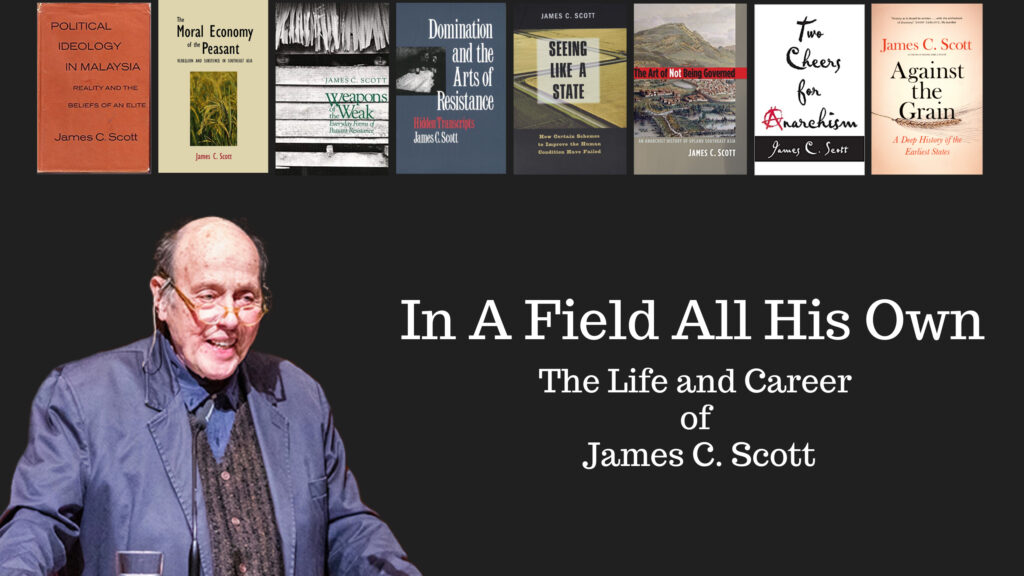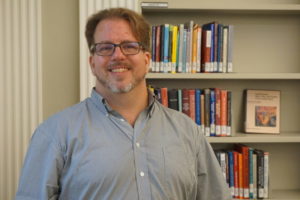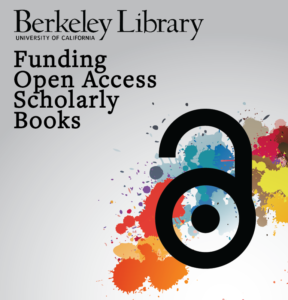Tag: social sciences
Oral History Center Releases Documentary on Famed Yale Social Scientist James C. Scott
In A Field All His Own: The Life and Career of James C. Scott
“James C. Scott is regarded by many as one of the most influential thinkers of our time.”
The Oral History Center at UC Berkeley is proud to release, In A Field All His Own: The Life and Career of James C. Scott, a documentary that offers an unprecedented look at the famed Yale political scientist. Created and produced by UC Berkeley Oral History Center (OHC) historian Todd Holmes, the film draws from nearly thirty hours of oral history interviews with Scott and affiliated scholars at Yale and UC Berkeley to trace the intellectual journey of the award-winning social scientist from his childhood in New Jersey through each of the ground-breaking works he produced throughout his accomplished career. Overall, the film presents an intellectual biography of one of the world’s preeminent academics, a feature that will serve as a treasured resource for students and scholars around the globe.

While intellectual biographies may not be a typical genre, Scott is far from a typical academic. Over the last fifty years, few scholars have achieved such prominence within the American academy as James C. Scott. The Sterling Professor of Political Science at Yale University, with appointments in anthropology and the school of forestry and environmental studies, he is regarded by many as one of the most influential thinkers of our time. Throughout his career, his scholarship became a series of major interventions that impacted dozens of disciplines across the humanities and social sciences. From the strategic rhythms of peasant life to notions of resistance and the functioning of the modern state, his work continually shaped and reshaped research agendas and discourses in the academy. By his retirement in 2022, Scott stood as one the most widely read social scientists in the world – an influence and distinction that placed him, as the film title suggests, “in a field all his own.”
The idea for the documentary developed out of the Yale Agrarian Studies Oral History Project, which Holmes conducted between 2018 and 2020. The focus of that project was to document the career of James C. Scott, as well as the thirty-year history of the renowned Yale Agrarian Studies Program he founded. Those oral history interviews, which the OHC released in 2021, served as the basis for the film. Holmes had worked for both Scott and the Agrarian Studies Program during his graduate studies at Yale. His motivation for both the project and documentary was to capture Scott’s story—in his own words—for future generations. As Holmes recalls, “I had the privilege of meeting and working with Jim Scott before ever reading Jim Scott, a unique vantage point that allowed me to develop a deep appreciation for the brilliant scholar behind the books—his limitless curiosity, his wit and humor, and the welcoming nature of his intellect. I wanted to capture these qualities in telling his story. His books will be read for generations to come; it was my hope that this film could serve as a companion and allow students and scholars to get to know James C. Scott and the inspiration behind his work.”
The film was made possible through the generous support of Yale University’s Program in Agrarian Studies, InterAsia Initiative, and Council on Southeast Asia Studies. It was produced by Todd Holmes in association with the UC Berkeley Oral History Center and Teidi Productions, a digital creations label he operates with his partner Heidi Holmes. The film is available to the public via YouTube.
About the Oral History Center
The Oral History Center of The Bancroft Library preserves voices of people from all walks of life, with varying political perspectives, national origins, and ethnic backgrounds. We are committed to open access and our oral histories and interpretive materials are available online at no cost to scholars and the public. You can find our oral histories from the search feature on our home page. Search by name, keyword, and several other criteria. Sign up for our monthly newsletter featuring think pieces, new releases, podcasts, Q&As, and everything oral history. Access the most recent articles from our home page or go straight to our blog home.
Social Sciences’ Brian Light Elected to UC-wide Council

Just a year ago, we posted about the election of Brian Light, the Chief Operations Manager for the Library’s Social Science Division (AKA the guy who makes everything happen), to the Governing Council of the Berkeley Staff Assembly (BSA). The BSA “creates community, champions the interests of staff, and provides opportunities for networking and development”. It has been a great fit— Brian cares deeply both about the campus and making sure staff have a good experience here. In fact, he recently helped offer a “Staff Perspectives” event which included a presentation and discussion on the demographic makeup of Berkeley’s staff and related trends, changes, and challenges.
Well, now Brian’s work for Berkeley and with the BSA is being recognized on an even larger stage— we are thrilled to announce that he has just been elected to the University of California-wide Council of UC Staff Assemblies. CUCSA has representatives from all of the UC campuses, and works on system-wide initiatives to benefit all staff. These include making proposals to the Board of Regents and conducting biennial staff engagement surveys. In addition, “CUCSA has been instrumental in the success of several initiatives including the formation of the Staff Advisors to the Regents role, post-employment benefits, and domestic partnership benefits”. No one could deserve this honor more, and no one will work harder for the benefit of all UC staff than Brian!
Congratulations, Brian, and please keep us posted about your experiences with CUCSA!
Recent research in psychology: What does it mean to feel authentic in a relationship?

Read the full story:
- Gan, M., & Chen, S. (2017). Being your actual or ideal self? what it means to feel authentic in a relationship. Personality and Social Psychology Bulletin, 43(4), 465-478. (UCB access only)
- Also, see news media coverage of this study.
Library will fund publishing of open access scholarly books
 The Library is expanding the Berkeley Research Impact Initiative (BRII) program so that Berkeley authors can publish scholarly books open access at zero or substantially reduced costs—making these books free and accessible to readers around the globe.
The Library is expanding the Berkeley Research Impact Initiative (BRII) program so that Berkeley authors can publish scholarly books open access at zero or substantially reduced costs—making these books free and accessible to readers around the globe.
The BRII program fosters broad public access to the work of Berkeley scholars by encouraging the Berkeley community to take advantage of open access (OA) publishing opportunities. OA literature is free, digital, and available to anyone online. With barrier-free access, researchers and decision-makers from anywhere in the world can read the scholarly output of UC Berkeley authors.
“OA publishing is helping us advance the relevance and reach of our science so that it can get in front of the people who need to be seeing it, and who are in a position to act upon the results of our research in ways that we as scientists alone can’t,” says Rachel Morello-Frosch, UC Berkeley Professor of Environmental Science, Policy and Management. “BRII helped me make access to my research affordable and it wiped away a lot of barriers.”
Morello-Frosch has published several articles OA using BRII funds. The funds are applied toward article processing charges (APCs), which many journal publishers impose on authors and which can range from $750-$3500 or more. These fees serve to replace revenue the publisher would have generated via library subscriptions if access to the journal had been licensed by the library for campus readers. BRII began in 2008 by redirecting a small amount of Library collections funds to help authors cover these APCs for open access journals so that Berkeley authors could participate in the wider dissemination that OA publishing offers.
While many scholars in the humanities and social sciences publish in OA journals, they also publish scholarly books, termed “monographs”. These books become a critical component of professional credentialing, yet their readership is limited by the same kinds of access barriers endemic to subscription-based journals: The scholarly books are quite expensive, and increasingly fewer libraries can afford to purchase them. By expanding BRII to also cover the publishing fees for OA books, BRII can help Berkeley authors publish long-form scholarship that can be read by anyone at no cost.
These digital editions of peer-reviewed and professionally edited OA books typically offer readers more than just the text itself. Digital monographs can also incorporate multimedia with the text, include annotation and commenting tools, and provide platforms that further encourage the development of innovative scholarship.
University presses’ funding models for financing OA books are innovative and evolving. UC Press’ Luminos program, for instance, is formulated as a partnership in which costs and benefits are shared by member organizations. Many academic publishers also offer a print or print-on-demand version of the book for sale to readers who prefer hard copies, further enabling cost recovery through traditional print sales. Some publishers have found that making the book available OA not only drives up digital readership but also print sales, too.
At their core, most OA book funding models typically charge academic authors the equivalent of an APC. Yet, given the greater investment needed to create and edit longer and more complex manuscripts, the book processing charges (BPCs) can range upwards of $7000. This sum can be out-of-reach for humanities and social sciences authors if available funding sources do not adequately cover research and publication needs.
To address this situation, in this first pilot year of funding BPCs, BRII will offer $7500 a piece in publishing fees for up to three OA scholarly books.
“The expanded BRII program will support increased OA publishing by Berkeley humanists and social scientists, and augment the reach of their work,” explains University Librarian Jeffrey MacKie-Mason. “We aim to democratize scholarly publishing by lowering access barriers and increasing Berkeley impact, and subvention funding for OA books allows us to do just that.”
To learn more about the expanded BRII program, please see the updated BRII guide. With questions about obtaining BRII funding, contact openaccess@lists.berkeley.edu.